At the AFA Annual General Meeting (AGM) in Nisku on January 21 and 22, 2020, producers, industry partners, students and representatives from several agricultural organizations gathered together to discuss current issues facing Alberta producers. The following is a recap of the meeting.
Sustainability actions spearheaded in the province
Speaker Tom Lynch-Staunton, Chair of the Canadian Roundtable for Sustainable Beef (CRSB) Scientific Advisory Committee and Policy Manager for Alberta Beef Producers, spoke passionately about the activities the CRSB has undertaken to share the message of sustainable beef, set up a framework for certification, working with farm and ranch operators to become certified, the food retailers they are working closely with, and more.

Tom Lynch-Staunton on the CRSB sustainability activities.
Tom also shared the current projects the CRSB is working on including species at risk on agricultural lands and consumer perceptions of beef sustainability. “People like the concept of sustainability,” Tom said. “It makes sense to them and that’s a good sign for us.” Find out more about the CRSB here https://youtu.be/9ktl0ZYRmE4.
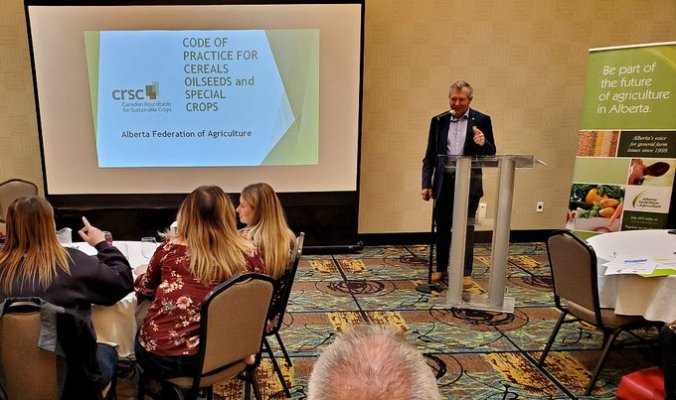
Ted Menzies with information from the CRSC.
Speaker Ted Menzies presented on behalf of the Canadian Roundtable for Sustainable Crops and expressed the need for a Code of Practice for cereals, oilseeds and special crops to establish a baseline to show what crop producers are doing is sustainable in improving air, water and soil quality.
Currently, there is no baseline Code of Practice for crops to show consumers and customers, and participation in sustainable practices by producers is voluntary. This crops Code of Practice would be complementary to other programs like Environmental Farm Plans. “We grow some of the most sustainable crops in the world,” Ted said, “but we need to talk about the ways we do that. It’s about proving what we are already doing is right.”

Ben Wilson, filmmaker, shares his perspectives on storytelling in agriculture.
We were pleased to screen the new documentary Guardians of the Grasslands and have one of the film’s creators, Ben Wilson of Story Brokers Media House, with us to share his advice on the best ways to tell stories in agriculture. “Storytelling without a strategy is just monologuing,” Ben said. He stressed the importance of two-way engagement with audiences and shared ways to do that. While the documentary has not yet been made public, Ben encouraged anyone who wants to privately screen Guardians of the Grasslands can reach out to them on their website. https://guardiansofthegrasslands.ca
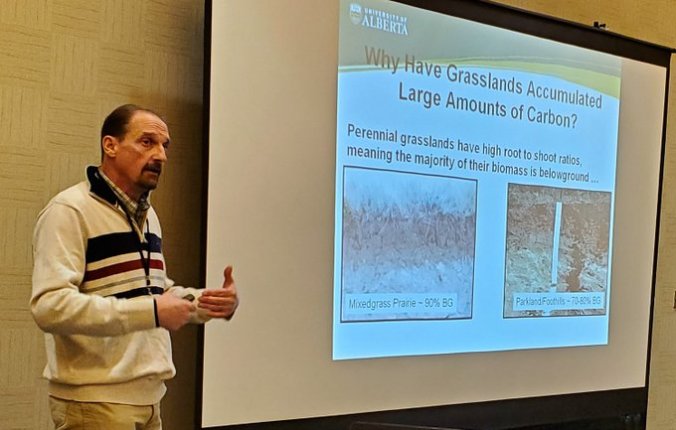
Dr. Edward Bork discusses the effects of grazing on soil carbon.
After seeing the inspiring documentary about grasslands, a natural follow up was the discussion from Dr. Edward Bork, Mattheis Chair, Rangeland Ecology & Management with the University of Alberta. Dr. Bork and his team are studying the role of grasslands in carbon storage and looking at the effects of grazing on soil carbon. He presented the many benefits of grasslands to society and said they are investigating whether adjusting grazing management practices can increase carbon storage and pointed out that these gains may have economic value for producers.
Update and directions from Canadian Farm Leaders
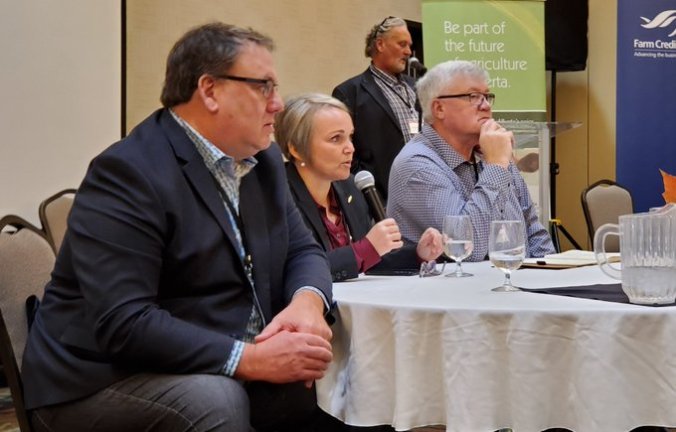
L-R: Todd Lewis, Mary Robinson & Lynn Jacobson. Humphrey Banack (background) moderated.
Our Canadian Farm Leaders Panel spoke about issues of importance in Canadian agriculture. Mary Robinson, President of the Canadian Federation of Agriculture (CFA), Todd Lewis, President of the Agricultural Producers of Saskatchewan (APAS) and Lynn Jacobson, AFA President, shared their thoughts on carbon tax, environmental stewardship, farm labour and opportunities in Canadian agriculture, with AFA Director Humphrey Banack moderating.
Questions from the audience included issues dealing with deadlines for mandatory entry-level training (MELT), farm labour shortages, how agriculture can speak with a common voice, and more. Later in the afternoon, CFA President Mary Robinson updated us about the advocacy CFA is undertaking on behalf of Canadian producers to ensure Canadian agriculture thrives. She shared activities on Business Risk Management, farm labour, grain transportation, rural infrastructure and more.

Lakeland College students hear about agriculture policy from Bob Friesen.
While the Canadian Farm Leaders Panel was underway, student attendees from the Lakeland College Agribusiness Marketing and Livestock program enjoyed a break out session and workshop on agriculture policy with expert Bob Friesen.
AgSat: a new tool for Canadian producers offered by AFA and Aquanty
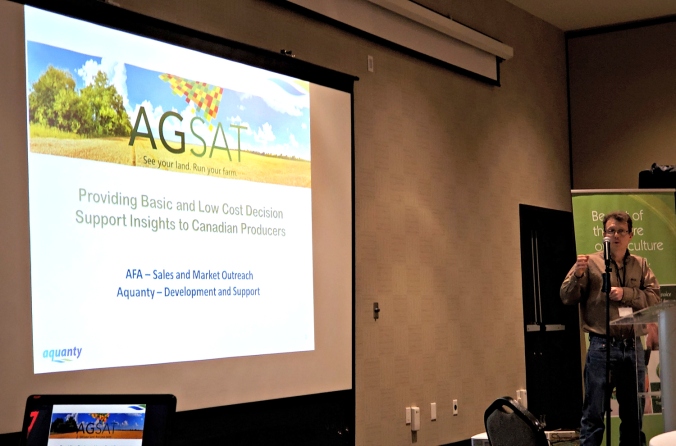
Steve Frey from Aquanty on the new AFA-Aquanty online tool AgSat.
An important part of sustainability is the ability to use digital tools to help make decisions on the farm. AFA AGM attendees got an update on the development of AgSat, the new remote sensing platform owned by AFA and designed by Aquanty that provides producers with access to important essential data for their land at an accessible price.
Today, Canadian farm producers are using field and production data more than ever before to manage their operations. Producers have access to a wide variety of data and precision farming services, but these services can be complex and require a consultant to interpret or use the information on the farm. While AgSat doesn’t compare to these types of services on a feature-by-feature basis, AgSat does provide entry level access to satellite, mapping and weather-related information, putting these tools in the hands of producers for a much smaller investment.
“There’s a digital revolution going on in agriculture right now, with many companies providing valuable products and services to producers,” says Lynn Jacobson, AFA President. “We don’t want farm size and finances to be barriers that keep some producers from participating. AgSat will be of value and within financial reach of any producer, that’s why AFA and Aquanty are working on this new tool together.”
Agriculture policy resolutions and debates

Grace MacGregor shares the AFA Board Update just before AGM resolutions get underway.
The AGM is also a time for AFA members to propose, debate and vote on resolutions that deal with issues that affect Alberta farm producers. During the AGM, members discussed, voted on and passed the following resolutions:
Carbon Offset: BE IT RESOLVED that AFA approach the Minister of Environment and Parks to request that the 40% compliance cap be removed for Alberta agriculture such that producers can continue to participate in the Protocol and have their carbon sinks recognized nationally and internationally even up to 100% compliance.
Carbon Footprint of Beef Production: BE IT RESOLVED that AFA caution the uncritical acceptance of claims made about the carbon footprint of beef production and urge the scientific evaluation of beef production systems including the use of land not so suitable for grain production.
Crop Insurance: BE IT RESOLVED that AFA approach AFSC to request that the lack of moisture program be extended to cover forages and combine-able crops.
Tree Planting Incentives: BE IT RESOLVED that AFA, through CFA, approach the federal departments of Natural Resources and Agriculture and Agri-Food in support of tree planting and to suggest that financial incentives be offered to agricultural producers to plant shelterbelts and other trees and for the maintenance of existing natural treed areas.
Grain Drying: BE IT RESOLVED that AFA, through CFA, petition the Government of Canada to exempt propane and natural gas used in grain drying from the carbon tax.
Canadian Grain Commission: BE IT RESOLVED that through CFA, AFA campaigns to ensure that the updated Canada Grain Act clearly states the CGC mandate is to work in the interest of grain producers.
Food Awareness: BE IT RESOLVED that AFA, through CFA, seeks avenues to raise awareness within government and the general population of the relationship between agricultural production and food, and that the Canada Food Policy needs to address food security, sustainability and sovereignty in terms of agricultural production, as well as food safety.
Family Farms: BE IT RESOLVED that AFA, through CFA seek avenues to raise awareness within government and the general population of the role of the family farm in providing benefits to the Canadian public as a whole.
Carbon Tax: BE IT RESOLVED that CFA encourage the federal government to recognize agriculture’s ability to sequester carbon by the following methods:
- Establish a national program such that carbon emitters and sequesters, including agricultural producers, can trade carbon credits, and
- Allow agricultural producers to offset any carbon tax they may have to pay by carbon credits earned.
Farm Employee Insurance: BE IT RESOLVED that AFA campaign the provincial government to reconsider allowing farm operations not to carry insurance on non-family employees and instead make insurance mandatory for all workers.
Payment Protection Fund: BE IT RESOLVED that AFA urge the CGC to establish a pool payment protection fund similar to that currently in place with the Alberta Farm Implement Board, such that all licensed grain traders pay an annual proportionate levy into the pool to ensure that producers are adequately protected against payment default of grain traders.
Seed Value Creation Model: BE IT RESOLVED That Agriculture and Agri-Food Canada immediately withdraw further consideration of the two proposed seed royalty models as presented and, in consultation with agricultural producers, only proceed with changes to plant breeder’s rights and crop development funding models that result in a system that:
- Maintains and enhances public research, development and finishing of new varieties;
- Preserves or enhances current public funding for agricultural research;
- Is transparent with producer involvement;
- Maintains the privilege and unencumbered use of farm saved seed;
- Is administered in a fair and equitable manner;
- Ensures Canadian producers can maximize their returns in a world marketplace.
Roll Over of Farm Assets: BE IT RESOLVED that CFA advocate for reforms to the tax system that would allow roll over of farm assets to extended family entrants or non-family entrants.
AFA delegates also re-confirmed the AFA Board of Directors and Executive for 2020 with Lynn Jacobson, Keith Degenhardt and Grace MacGregor all staying on as President, 1st and 2nd Vice President respectively. AFA’s leadership team will continue to engage in vital policy advocacy alongside Canada’s provincial and national farm organizations.
 To Jacobson, the conference speakers and resolutions discussed at the AGM reflect top concerns of producers right now. He believes that sustainability should not be viewed too narrowly.
To Jacobson, the conference speakers and resolutions discussed at the AGM reflect top concerns of producers right now. He believes that sustainability should not be viewed too narrowly.
“Our conference theme this year was sustainability and it’s important to remember that financial sustainability is part of the mix as we look at ways to enhance farming practices, land and environmental management and production sustainability in the future,” Jacobson said.

AFA 2020 Board of Directors
(Back) L-R Bruce Burnstad, Graham Gilchrist, Humphrey Banack, Kerry Degenhardt
(Front) Grace MacGregor, Lynn Jacobson, Keith Degenhardt
 AFA’s Board and Executive is mixing it up this year by asking both AFA members and non-members to join them in Nisku, Alberta for the organization’s annual Conference and Annual General Meeting (AGM) on January 21 & 22, 2020.
AFA’s Board and Executive is mixing it up this year by asking both AFA members and non-members to join them in Nisku, Alberta for the organization’s annual Conference and Annual General Meeting (AGM) on January 21 & 22, 2020. Currently in Canada, there are commercially available, subscription- or fee-based remote sensing and drone-based data products which can add to the wealth of information for producers. Often, however, specialized software and data-management specialists are required to understand and use the raw data. Producers can subscribe to data feeds from agri-tech service providers, often on a per acre basis, and the cost of this can really add up.
Currently in Canada, there are commercially available, subscription- or fee-based remote sensing and drone-based data products which can add to the wealth of information for producers. Often, however, specialized software and data-management specialists are required to understand and use the raw data. Producers can subscribe to data feeds from agri-tech service providers, often on a per acre basis, and the cost of this can really add up.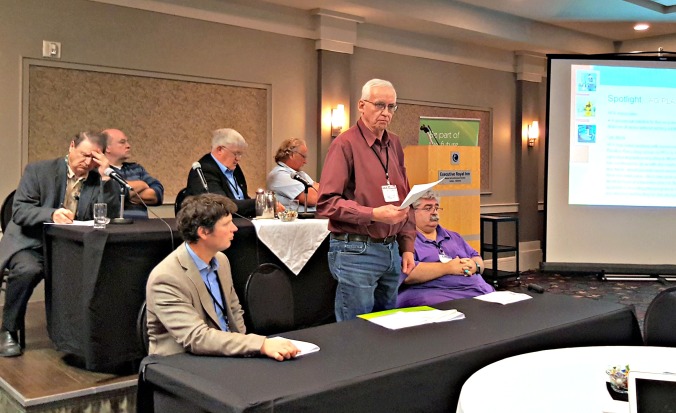 Producers attending the AFA AGM directly impact policy in agriculture for the year ahead since the resolutions agreed upon at the AGM are shared with policy makers in government and within provincial and national agriculture organizations.
Producers attending the AFA AGM directly impact policy in agriculture for the year ahead since the resolutions agreed upon at the AGM are shared with policy makers in government and within provincial and national agriculture organizations. This issue has long been a focus of AFA’s advocacy efforts, and it continues to be top-of-mind with the 2019 harvest underway. Canada’s rail transportation system is still struggling to meet the increased demand of grain movement and this trickles down to create costly delays for Canada’s farmers.
This issue has long been a focus of AFA’s advocacy efforts, and it continues to be top-of-mind with the 2019 harvest underway. Canada’s rail transportation system is still struggling to meet the increased demand of grain movement and this trickles down to create costly delays for Canada’s farmers. To get the perspectives of each federal party on agriculture, the CFA is hosting the AG Leaders’ Debate on Tuesday, September 24, 2019.
To get the perspectives of each federal party on agriculture, the CFA is hosting the AG Leaders’ Debate on Tuesday, September 24, 2019. Canadians live in a country where local food is plentiful, the food quality is outstanding and there is a strong agricultural community working to ensure our food is accessible and abundant.
Canadians live in a country where local food is plentiful, the food quality is outstanding and there is a strong agricultural community working to ensure our food is accessible and abundant.
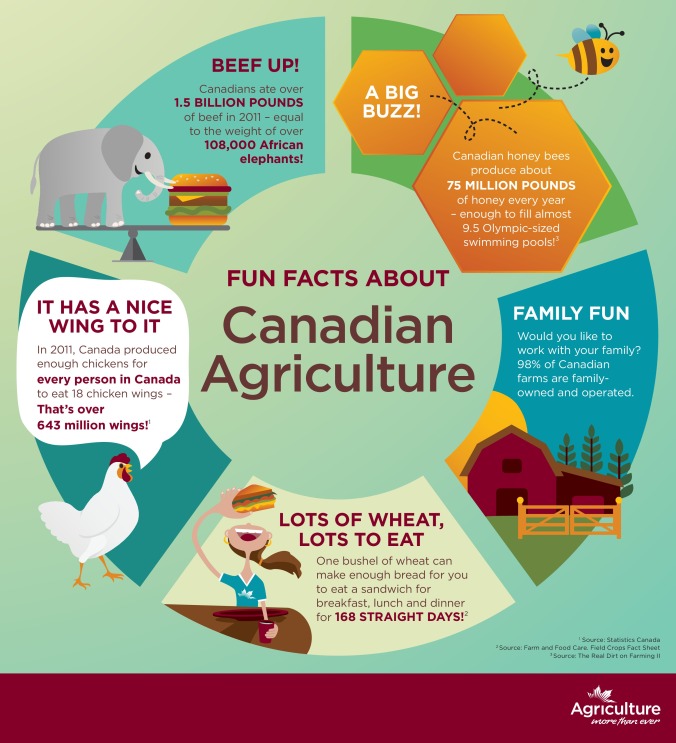
 How you can help
How you can help
 AFA President Lynn Jacobson points to three issues that currently have the potential to impact producers in a way they may not want. He says it’s not too late for Alberta producers to get involved in these issues, and the AFA AGM is a perfect place to start.
AFA President Lynn Jacobson points to three issues that currently have the potential to impact producers in a way they may not want. He says it’s not too late for Alberta producers to get involved in these issues, and the AFA AGM is a perfect place to start.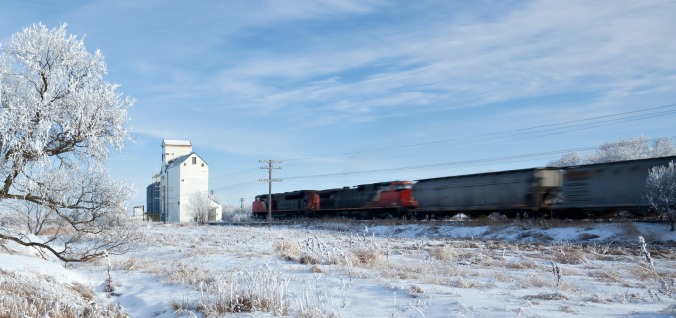 The oil industry isn’t the only one feeling the effects of delays in the Trans Mountain pipeline. Many agriculture groups are concerned that using the railway as an alternative transportation system for crude oil shipments will create undue stress for the agriculture industry, which is already dealing with a filled-to-capacity rail system.
The oil industry isn’t the only one feeling the effects of delays in the Trans Mountain pipeline. Many agriculture groups are concerned that using the railway as an alternative transportation system for crude oil shipments will create undue stress for the agriculture industry, which is already dealing with a filled-to-capacity rail system. The AGM will include presentations from AFA and industry as well as a provincial update from the Hon. Oneil Carlier, Alberta’s Minister of Agriculture and Forestry. A President’s Reception takes place on the evening of January 16 to kick off the meeting.
The AGM will include presentations from AFA and industry as well as a provincial update from the Hon. Oneil Carlier, Alberta’s Minister of Agriculture and Forestry. A President’s Reception takes place on the evening of January 16 to kick off the meeting. Check out these AFA membership benefits from our corporate
Check out these AFA membership benefits from our corporate 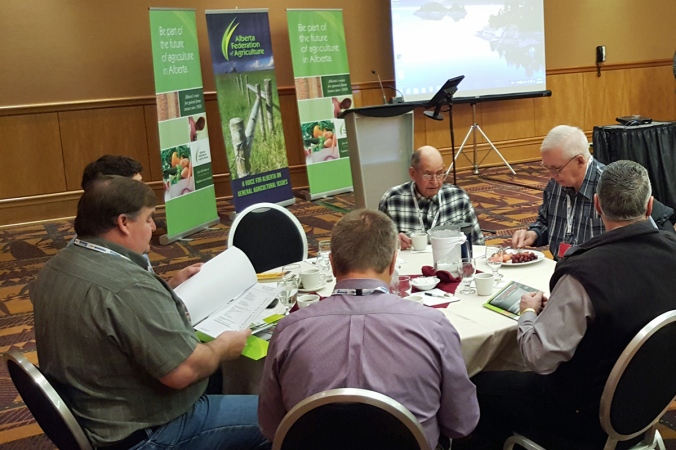


 AFA Director Humphrey Banack says he always looks forward to challenging debate and discussion when those passionate about agriculture get together.
AFA Director Humphrey Banack says he always looks forward to challenging debate and discussion when those passionate about agriculture get together. Humphrey Banack, who farms near Camrose, Alberta, reminds producers that it’s never been more important to speak up and drive agricultural policy decisions. He stresses that meetings like this are a direct channel for producers to let their voice be heard.
Humphrey Banack, who farms near Camrose, Alberta, reminds producers that it’s never been more important to speak up and drive agricultural policy decisions. He stresses that meetings like this are a direct channel for producers to let their voice be heard. Those wishing to get more involved in crafting the direction of the industry can do so in many ways.
Those wishing to get more involved in crafting the direction of the industry can do so in many ways. Popkin recently attended the Canadian Agricultural Safety Association (CASA) Annual General Meeting in Prince Edward Island in October (pictured here in the yellow jacket). The meeting put her in touch with new research and resources to share with others concerned about farm safety in Alberta.
Popkin recently attended the Canadian Agricultural Safety Association (CASA) Annual General Meeting in Prince Edward Island in October (pictured here in the yellow jacket). The meeting put her in touch with new research and resources to share with others concerned about farm safety in Alberta.